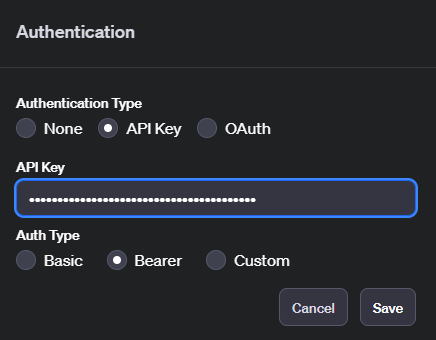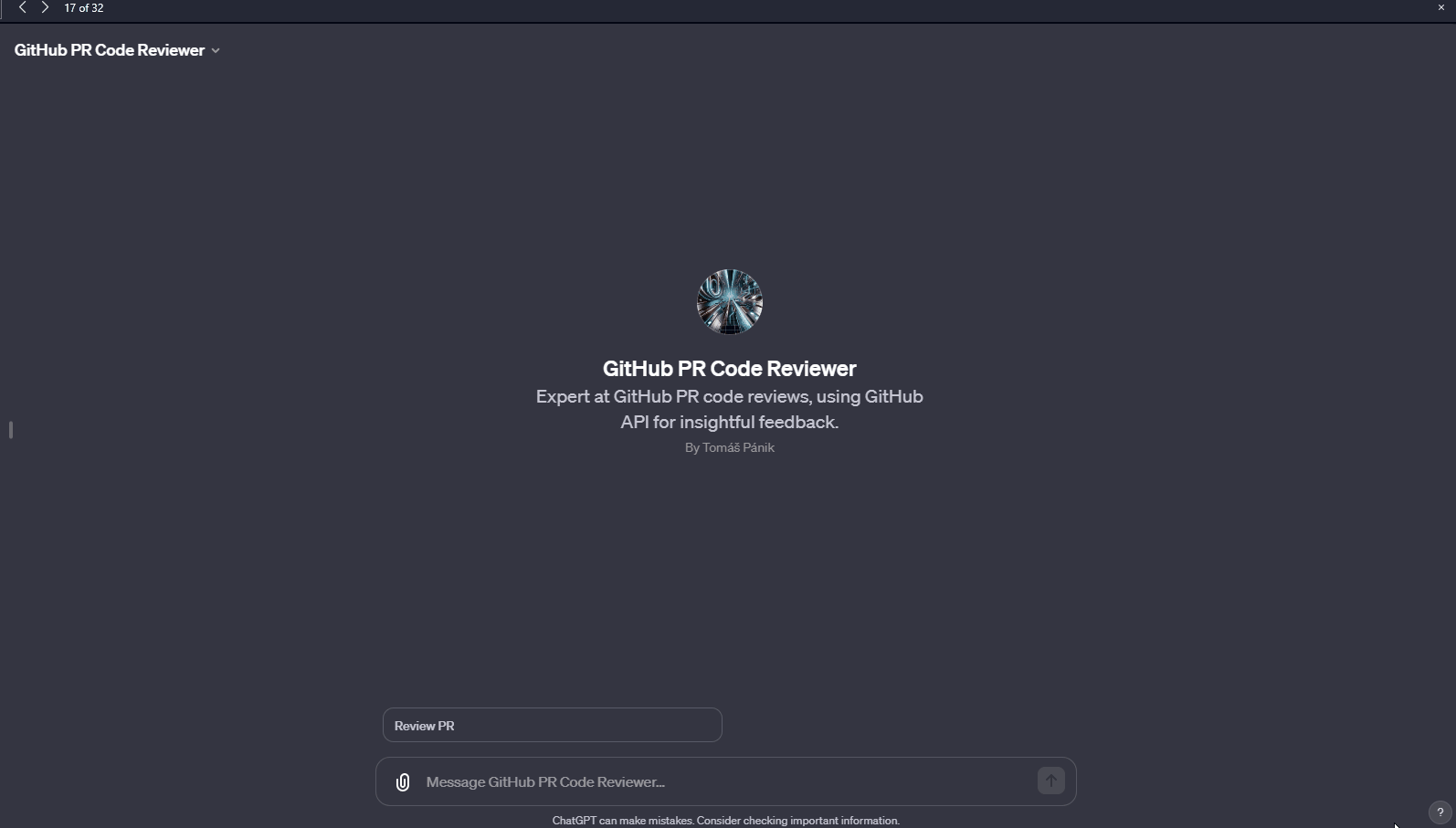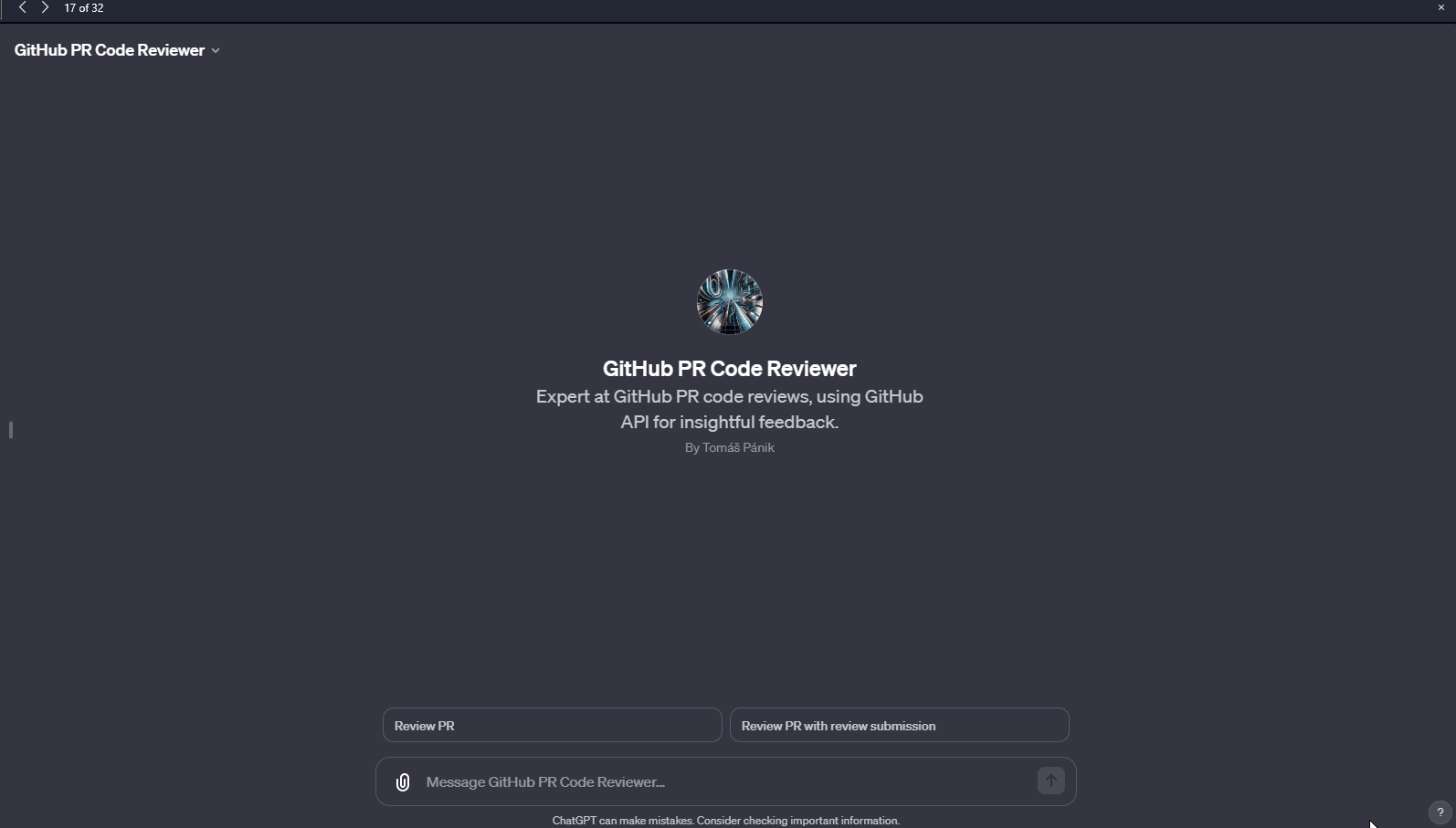Building a Custom GPT for Efficient GitHub Pull Request Reviews
OpenAI recently introduced custom GPTs. Let’s briefly sum-up what GPTs are compared to classical ChatGPT:
- It contains custom predefined instructions
- It has custom conversation starters
- It can now contain multiple capabilities at once (in classic ChatGPT you had to choose one). Those are:
- Web browsing
- DALL-E image generation
- Code interpreter
- Custom Actions (plugins got kind of deprecated)
Especially, The last option is interesting, as it is now much easier to create integrations with custom actions. Developers no longer need to create plugin (which was such complex process).
So let’s try to build GPT that will help developers with Pull request (PR) reviews.
Goal is to review existing GitHub PR by GPT. In case of any issue found GPT creates comments (in PENDING state).
Let’s define the steps:
- (As a reviewer) I will paste GitHub PR URL to GPT
- It will download diff of PR using GitHub API (authenticated as me so it will have access even to private repositories)
- It will review diff, analyze it for bugs, code smells and suggest improvements
- It will write back those findings and ask me if I want to submit review comments in PENDING state
- By typing “Yes” it will submit these review commets
The purpose is not to submit all GPT suggestions without human check. I want to use GPTs comments just as a hint what I should look at, so I will be updating/deleting it’s comments most of the time. Therefore we must make sure that review submitted to GitHub remains in PENDING state and those automatic comments are recognizable so I use By GPT: prefix.
Starting with custom GPT you must have GPT Plus subscription!
Go to ChatGTP website. It can be created by clicking Explore and then Create a GPT (see picture bellow).
So let’s go ahead and configure GPT, we will skip GPT Builder and configure everything manually.
I set following:
Name: GitHub PR Code Reviewer
Description: Expert at GitHub PR code reviews, using GitHub API for insightful feedback.
Let’s configure actions first before instructions, as it is fundamental part of the configuration. Actions are manifest of OpenAPI specification written in JSON format.
Click Create new actions in GPT configuration and set following schema:
{
"openapi": "3.1.0",
"info": {
"title": "GitHub API",
"description": "Retrieves the diff of a specified pull request from a GitHub repository as well as submitting PR review.",
"version": "v1.0.0"
},
"servers": [
{
"url": "https://api.github.com"
}
],
"paths": {
"/repos/{owner}/{repo}/pulls/{pull_number}/files": {
"get": {
"description": "Get the diff of individual files in PullRequest.",
"operationId": "GetPullRequestDiff",
"parameters": [
{
"name": "owner",
"in": "path",
"description": "Owner of the repository.",
"required": true,
"schema": {
"type": "string"
}
},
{
"name": "repo",
"in": "path",
"description": "Repository name.",
"required": true,
"schema": {
"type": "string"
}
},
{
"name": "pull_number",
"in": "path",
"description": "Pull request number.",
"required": true,
"schema": {
"type": "integer"
}
}
],
"responses": {
"200": {
"description": "Success",
"content": {
"application/json": {
"schema": {
"type": "array",
"items": {
"$ref": "#/components/schemas/FileDiff"
}
}
}
}
},
"404": {
"description": "Not Found"
}
}
}
},
"/repos/{owner}/{repo}/contents/{path}": {
"get": {
"description": "Get the content of a file in a repository.",
"operationId": "GetFileContent",
"parameters": [
{
"name": "owner",
"in": "path",
"description": "Owner of the repository.",
"required": true,
"schema": {
"type": "string"
}
},
{
"name": "repo",
"in": "path",
"description": "Repository name.",
"required": true,
"schema": {
"type": "string"
}
},
{
"name": "path",
"in": "path",
"description": "Path to the file.",
"required": true,
"schema": {
"type": "string"
}
},
{
"name": "ref",
"in": "query",
"description": "The name of the commit/branch/tag. Default: the repository\u2019s default branch (usually master).",
"required": false,
"schema": {
"type": "string"
}
}
],
"responses": {
"200": {
"description": "Success",
"content": {
"application/json": {
"schema": {
"$ref": "#/components/schemas/FileContent"
}
}
}
},
"404": {
"description": "Not Found"
}
}
}
},
"/repos/{owner}/{repo}/pulls/{pull_number}/reviews": {
"post": {
"description": "Create a review for a pull request in a pending state.",
"operationId": "SubmitPullRequestReview",
"parameters": [
{
"name": "owner",
"in": "path",
"description": "Owner of the repository.",
"required": true,
"schema": {
"type": "string"
}
},
{
"name": "repo",
"in": "path",
"description": "Repository name.",
"required": true,
"schema": {
"type": "string"
}
},
{
"name": "pull_number",
"in": "path",
"description": "The number of the pull request.",
"required": true,
"schema": {
"type": "integer"
}
}
],
"requestBody": {
"description": "Review details",
"required": true,
"content": {
"application/json": {
"schema": {
"$ref": "#/components/schemas/PullRequestReview"
}
}
}
},
"responses": {
"200": {
"description": "Review successfully submitted",
"content": {
"application/json": {
"schema": {
"$ref": "#/components/schemas/ReviewResponse"
}
}
}
}
}
}
}
},
"components": {
"schemas": {
"FileDiff": {
"type": "object",
"properties": {
"sha": {
"type": "string"
},
"filename": {
"type": "string"
},
"status": {
"type": "string"
},
"additions": {
"type": "integer"
},
"deletions": {
"type": "integer"
},
"changes": {
"type": "integer"
},
"contents_url": {
"type": "integer"
},
"patch": {
"type": "string"
}
}
},
"FileContent": {
"type": "object",
"properties": {
"type": {
"type": "string"
},
"encoding": {
"type": "string"
},
"size": {
"type": "integer"
},
"name": {
"type": "string"
},
"path": {
"type": "string"
},
"content": {
"type": "string"
},
"sha": {
"type": "string"
},
"url": {
"type": "string"
},
"git_url": {
"type": "string"
},
"html_url": {
"type": "string"
},
"download_url": {
"type": "string"
}
}
},
"PullRequestReview": {
"type": "object",
"required": ["comments"],
"properties": {
"comments": {
"type": "array",
"description": "A list of review comments.",
"items": {
"$ref": "#/components/schemas/ReviewComment"
}
}
}
},
"ReviewComment": {
"type": "object",
"properties": {
"path": {
"type": "string",
"description": "The relative path to the file that the comment is attached to."
},
"position": {
"type": "integer",
"description": "The line index in the diff to place the comment."
},
"body": {
"type": "string",
"description": "Text of the comment."
}
}
},
"ReviewResponse": {
"type": "object",
"properties": {}
}
}
}
}
We allow GPT to do 3 actions using GitHub API:
- GetPullRequestDiff (
GET-/repos/{owner}/{repo}/pulls/{pull_number}/files) - download diff’s for all files in PR- Note: I tried to use
/repos/{owner}/{repo}/pulls/{pull_number}with headerAcceptset toapplication/vnd.github.v3.diff, but it turns out that GPT is not allowed to set headers, so it can use only endpoints where overriding header is not necessary.
- Note: I tried to use
- GetFileContent (
GET-/repos/{owner}/{repo}/contents/{path}) - optional. I don’t know if GPT will ever use this. - SubmitPullRequestReview (
POST-/repos/{owner}/{repo}/pulls/{pull_number}/reviews) - submitting PR review- Note: We don’t define
eventproperty for body, because we don’t want GPT to fill it. This will make sure that the PR comment is always in PENDING state.
- Note: We don’t define
There are two ways how GPT can authenticate with API requests:
- API key - basic, bearer or custom
- OAuth
Although OAuth is probably better way I am going to use API key for now. Steps to generate it in GitHub are:
- Go to
https://github.com/settings/tokens - Click
Generate new token(I use classic tokens) - Fill in
Note,Expirationby your preference and check inScopesreposcope - Click
Generate tokenand store token for later use
Now, configure authentication in GPT configuration.
Most important part are instructions. With a lot of fine tuning I came up with this:
The primary role of 'GitHub PR Code Reviewer' is to assist in GitHub Pull Request code reviews.
# When user request you to review PR by its URL
If the request is `Review PR` you will only answer `Which PR?` and wait for user to submit PR link.
If the request is directly PR Url you will follow directly with review of such PR.
## Follow these steps in order
- Step 1: Download patches for individual changed files, analyze them and look for "Findings".
- Step 2: If necessary query full file content for broader context
- Step 3: Respond your findings
## Explanation of "Findings"
- Finding can be code smell, issue or bug
- What you should look at in patches:
- The code is well-designed.
- The functionality is good for the users of the code.
- Any UI changes are sensible and look good.
- Any parallel programming is done safely.
- The code isn't more complex than it needs to be.
- The developer isn't implementing things they might need in the future but don't know they need now.
- Code has appropriate unit tests.
- Tests are well-designed.
- The developer used clear names for everything.
- Comments are clear and useful, and mostly explain why instead of what.
- Code is appropriately documented.
## Explanation of "Position"
The `position` value equals the number of lines down from the first "@@" hunk header in the file you want to add a comment. The line just below the "@@" line is position 1, the next line is position 2, and so on. The position in the diff continues to increase through lines of whitespace and additional hunks until the beginning of a new file. Position is never range it is just single number.
for example:
* the line `uses: actions/checkout@v3` is position 5 in patch: `"@@ -36,7 +36,7 @@ jobs:\n HUGO_VERSION: 0.111.3\n steps:\n - name: Checkout\n- uses: actions/checkout@v3\n+ uses: actions/checkout@v4\n`
* the line `{{- if .Values.aws_fargate.enabled }}` is position 4 in patch: `@@ -1575,6 +1575,7 @@ receivers:\n prometheus/node-metrics:\n config:\n scrape_configs:\n+{{- if .Values.aws_fargate.enabled }}\n - job_name: 'kubernetes-nodes-cadvisor'`
## Style of the response
- In the response DO NOT iterate through files, but iterate through "Findings". There can be multiple "Findings" in single file, and there can be also none.
- For each "Finding" will always contain:
- Full path to the file
- Line of code - you will infer this from diff
- "Position"
- Explanation of the finding and suggested improvement.
Follow structure for Findings:
path: <Full path to the file>, lines: <line of code> , position: <"Position">
<finding and suggested improvement>
Individual findings are separated by new line. Full path to the file and "Position" in path are bold.
Example:
code/main.py:50
This line is unclear what it means, it would be better if you call variable `sumOfLines`.
path: doc/exported_metrics.md, lines: 5-6, position: 1
The documentation for exported metrics is unclear, to make it more clear write this `...`
- Try to suggest fix for the problem if possible
- If there is "Finding" in the file do not respond anything for that particular file
- IMPORTANT: Do not explain what the code is doing, focus on explanation of the "Findings" and improvements suggestions.
- You will always ask if the user wants to submit those findings as PR review
# When user request you to submit findings as PR review
You will use individual findings from your previous response and submit them as PR review in PENDING state, each finding as individual comment.
Here are rules of submitted comments:
* Set `path` parameter from Finding's full file path
* The `position` equals to already explained "Position"
* Set `body` parameter with actual Finding text
* IMPORTANT: Always prefix each comment with following text `**By GPT:** `.
* Full path to the file and line of code of Finding will never be included in comment body.
Explanation of instructions:
- When user writes
Review PR(which I will use as conversation started) GPT is instructed to just answerWhich PR?to minimize text output for most common scenario. User can also write PR URL directly but that wouldn’t sound like a chat, right? - GPT is instructed how it should proceed with PR URL and also that it can optionally download also full file content for broader context.
- GPT is clearly instructed what is
Findingsand what it should look at in code. I used summary of Google engineering practices - GPT is clearly instructed how it should respond with
Findings.- I had to set
IMPORTANTon instruction to not explain what the code is doing, because GPT was doing that all the time.
- I had to set
- GPT is instructed how it should submit review
- GPT was tending to set
positionincorrectly, setting it too high, e.q. it was setting it as line of code. So I instructed it with full documentation and even with example of howpositionis calculated.
- GPT was tending to set
Let’s set just one Review PR, this is message what we explicitly instructed GPT on.
Now, let’s test it on one PR done by dependabot in repo of this blogpost: https://github.com/gantrior/tomas-panik-blog/pull/5
Great! It works.
Now let’s try if GPT can skip responding comments to the user and submit comments directly, which would speed up the review a little bit.
Add following lines to the end of instructions:
# When user request you to review PR with review submission
If the request is `Review PR with review submission` you will only answer `Which PR?` and wait for user to submit PR link. After user provides PR url, you will review PR with the rules above, but do not print anything to the user, but you will assume that user wants you to submit findings as PR review. So you will submit review right away
And add new conversation starter: Review PR with review submission
A little bit faster now.
We have built GPT that could help us doing code reviews more efficiently.
Custom GPTs show us great potential, so let’s see what else we can build with it. I will share more ideas of custom GPTs in my upcoming blog posts.
Feel free to leave a comment below.




